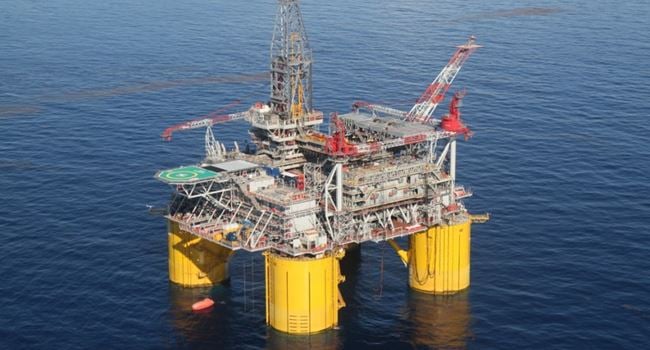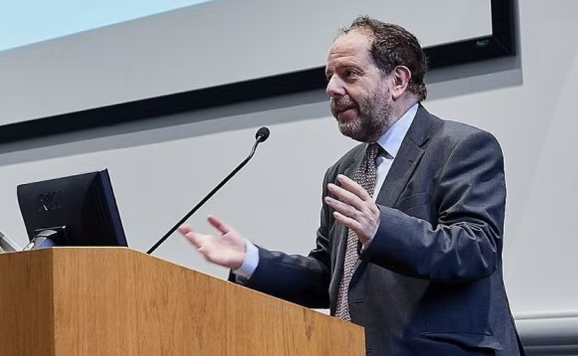This photo is not GHL's oil rig. It's only used for illustrative purposes.
The Nigerian Upstream Petroleum Regulatory Commission (NUPRC) has unveiled a three-year plan (2024 to 2026) for operations in the oil and gas sector.
Gbenga Komolafe, the chief executive officer of NUPRC, spoke in a statement, on Sunday.
He said the commission plans to commence the implementation of a new administrative procedure for managing royalties in 2024.
Komolafe said the new regulation would include a zero default system which ensures a 100 percent payment of royalty as and when due “without allowance for any default or late payment”.
Advertisement
“The foregoing represents in broad terms the key thematic focus areas that would underpin the Commission’s activities in 2024,” he said.
“These are in addition to the Commission’s commitment to its general objectives and functions as provided in the PIA and by implication all other laws relating to upstream petroleum operations in Nigeria.”
Meanwhile, based on the provisions of paragraphs 8 (1) and 23 (1&2) of the seventh schedule of the Petroleum Industry Act (PIA), the commission said it has established an oil and gas pricing and value monitoring desk to study trends and assumptions.
Advertisement
“The Desk will carry on market analysis and forecasts that will avert undue exposure to Nigeria and industry stakeholders,” Komolafe said.
NEW PRODUCTION CURTAILMENT AND DOMESTIC CRUDE SUPPLY REGIME
In addition, the NUPRC boss said the commission will establish a new production curtailment and domestic crude supply obligation regime in the year.
This, he said, will be based on the domestic crude oil supply administration regulations, 2023.
Advertisement
“The strategy of implementation shall where necessary and as required by the PIA and the applicable regulations involve the engagement of other agencies to ensure that the objectives of the laws and regulations are met,” he said.
‘PROMOTE EASE OF ENTRY AND INVESTMENT RETENTION’
In furtherance of the mandates in sections 6(h) and 66(e) of the PIA, Komolafe said the commission has conducted a review of the state of the upstream oil and gas industry in Nigeria “to enunciate appropriate strategies for encouraging and facilitating investment in the industry as well as encouraging new entrants”.
In addition to upstream capital investment trends, he said the commission has identified other key barriers to entry.
Advertisement
The NUPRC boss listed the impediments to include global concerns on climate change, local content requirements, infrastructure deficit and inadequate local gas market, access to finance, paucity of data in frontier areas.
Others, he said, are lack of a well-defined periodicity for competitive licensing rounds, high front-loaded entry fees, bureaucratic bottlenecks and high cost of development and production.
Advertisement
“Thus, the Commission will fashion out implementable strategies to retain existing investments, encourage additional investments by existing licensees and lessees and attract fresh investments by eliminating identified barriers such as high signature bonus payments, convoluted assignment procedures, high cost of development and production and restiveness in producing communities,” the statement reads.
To achieve the objective, Komolafe said the commission would, in 2024, establish and implement “the ease of investment in Nigeria stream oil and gas initiative”.
Advertisement
Komolafe said the initiative is also aimed at seeking the collaboration of government agencies, state, and local governments as well as oil and gas operators and the communities to sign up a protocol on ease of investment and operations in oil and gas activities, to be developed by the commission.
‘OPTIMISATION OF FEDERATION OIL REVENUES’
Advertisement
According to the NUPRC CEO, the decline in production in recent years has been considerable with output hovering around 1.4-1.6 million barrels per day, “due to security challenges, reduced investments, and energy transition-induced defunding of fossil fuels”.
“Be that as it may, the Commission, in collaboration with relevant government entities, is pursuing measures to complement the kinetic efforts of security forces, to grow oil production progressively to 1.8 MMBOPD – 2.6 MMBOPD and gas to about 10 BSCFD within the period,” he said
“These interventions include operational optimisation and enablers to delivering high-impact projects within the portfolios of Producers.
“Within the context of the overall drive for national production growth, the Commission will, in the near term, encourage a renewed production philosophy.”
Komolafe said the “philosophy” will prioritise monetised production (output from assets within networks that are less prone to third-party interference and theft).






